Blinken attends 'historic' Israeli, Arab summit amid Iran deal tensions, Palestinian opposition
It was the first meeting with four Arab countries' foreign ministers in Israel.
SDE BOKER, Israel -- Out here in the Negev desert, the Israeli government says, history is being made.
Israeli Foreign Minister Yair Lapid hosted for the first time on Israeli soil the foreign ministers of four Arab countries that now have close ties with the Jewish state -- a new reality for a region realigned in recent years, especially by the threat from Iran.
U.S. Secretary of State Antony Blinken joined them for what Israel calls the Negev summit, but only after an evening of meetings with Palestinian leadership, including President Mahmoud Abbas, and civil society Sunday. While these new Arab-Israeli ties have been heralded for bringing peace and stability, they have left the Palestinians behind and done little to address the decades-old tensions there.
"These regional peace agreements are not a substitute for progress between Palestinians and Israelis," Blinken said standing next to Lapid, reiterating his call for the two sides to achieve "equal measures of freedom, security, opportunity, and dignity and create the conditions for a negotiated two-state solution."
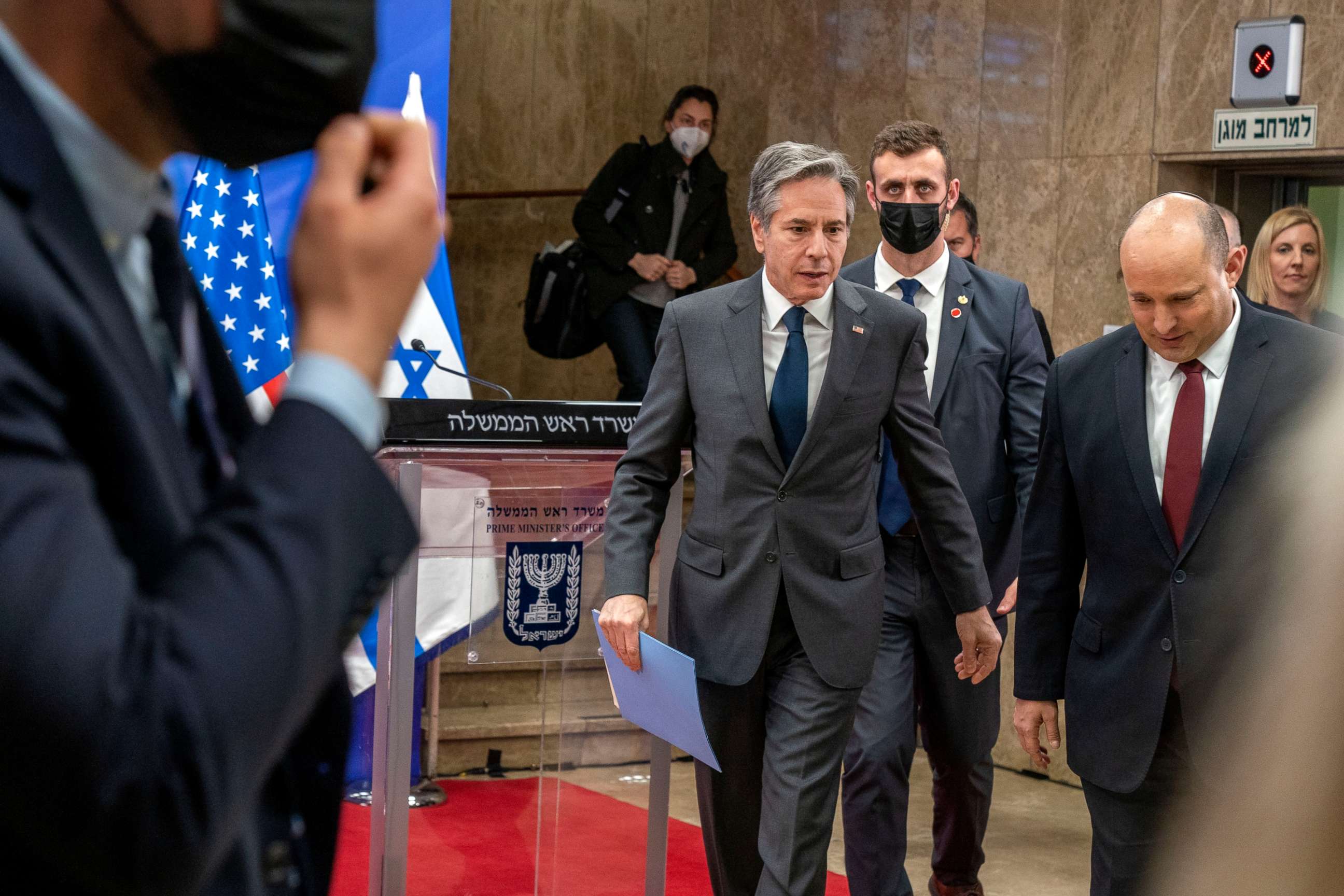
The Biden administration is trying to patch up ties with the Palestinians after frosty Trump years -- especially with the specter of violence hanging over next month. Passover and Ramadan coincide, setting the stage for potential sparks like last spring's deadly fighting.
Even so, Biden's team has also embraced Trump's Abraham Accords, the deals that established ties between Israel and several Arab neighbors -- a rare piece of continuity between the two administration's foreign policies.
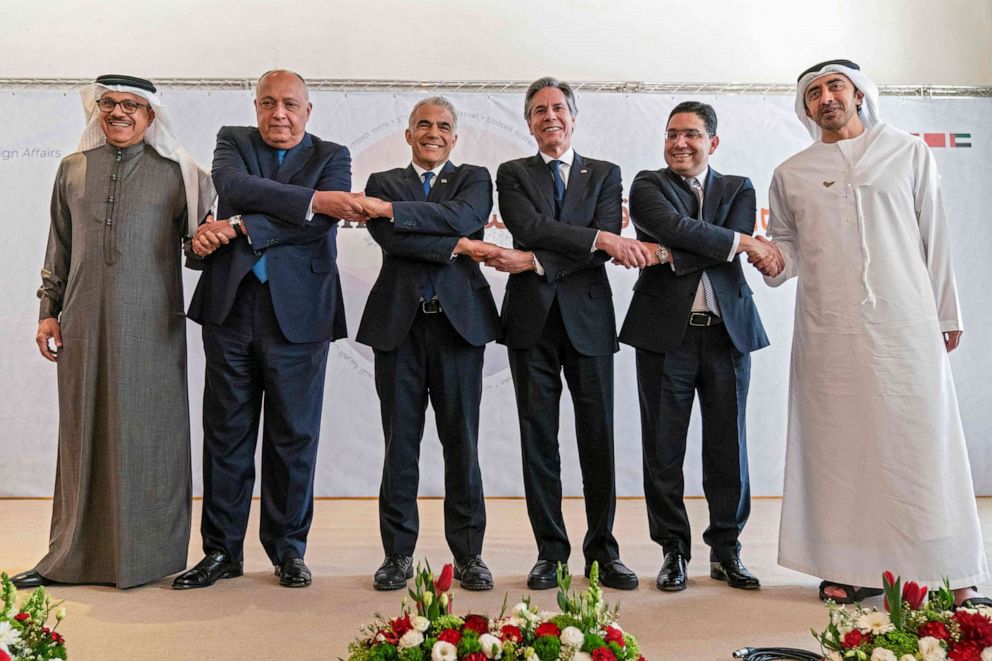
Monday's meeting brought together Israel and the U.S. with the United Arab Emirates, Bahrain, and Morocco -- all members of the new accords. Egypt, which established ties with Israel over 40 years ago in a U.S.-brokered deal, also attended. Sudan, which was part of the accords, did not either, after a military coup last fall derailed its transition to a civilian-led democracy.
"What we are doing here is making history," Israeli Foreign Minister Yair Lapid declared in the Negev, the southern Israeli desert where he brought together Blinken and four Arab foreign ministers.
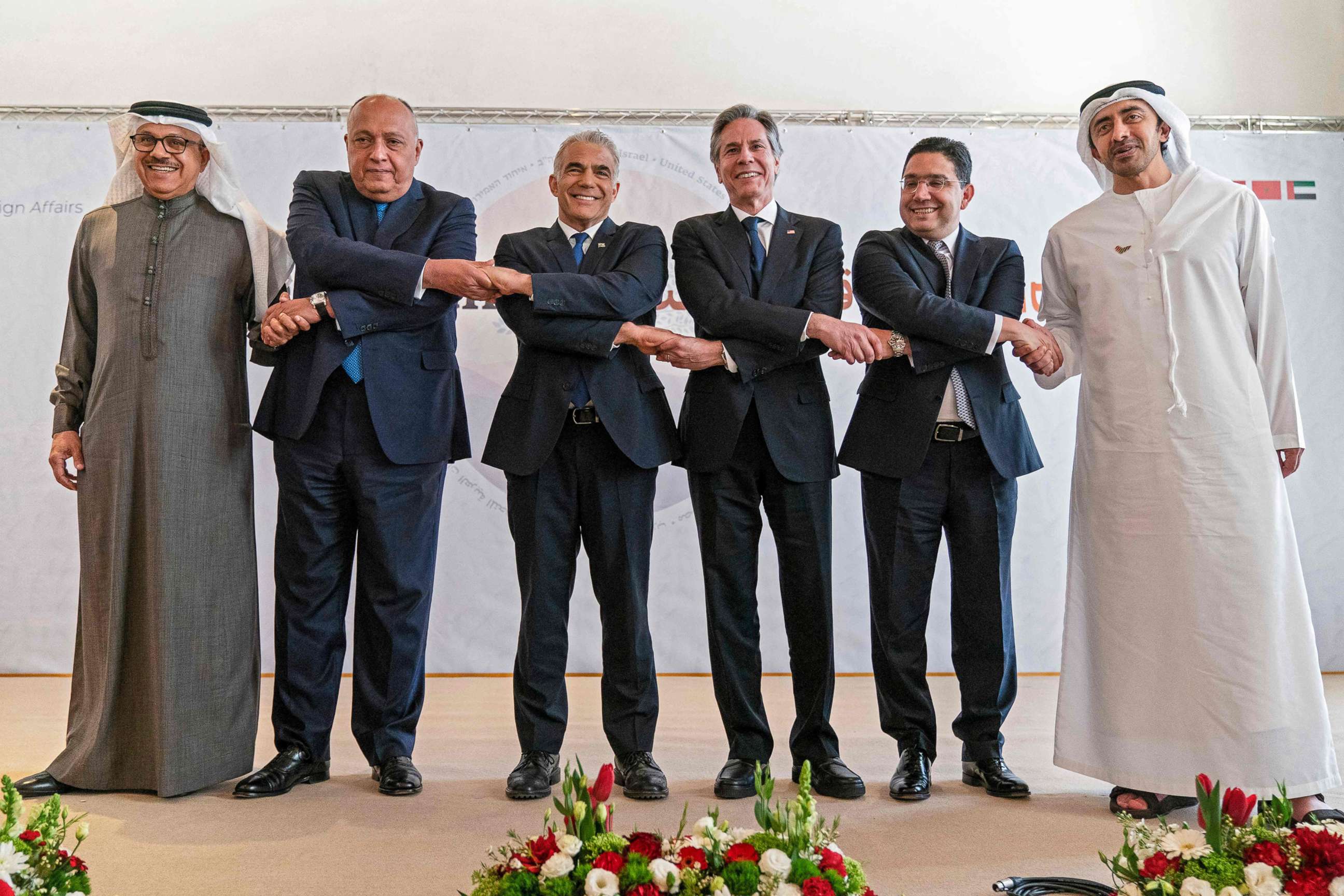
There was no shortage of flowery statements for what was billed as a "historic summit" on Israeli soil, between Israel and the Arab countries it has ties with -- although notably, Jordan, which established ties in 1994, skipped it with King Abdallah instead traveling to the West Bank to meet Palestinian President Mahmoud Abbas.
Blinken sang from the same sheet music Sunday, with he and other U.S. officials saying they believe deepening ties will help anchor peace across the region.
"What we're seeing is normalization become the new normal for this region," he said during a photo op with Israeli President Isaac Herzog -- a line he deployed repeatedly during his visit. "The United States is very proud to be a part of that -- to support the efforts to deepen the partnerships with countries that have already normalized with Israel and to help seek new partners."
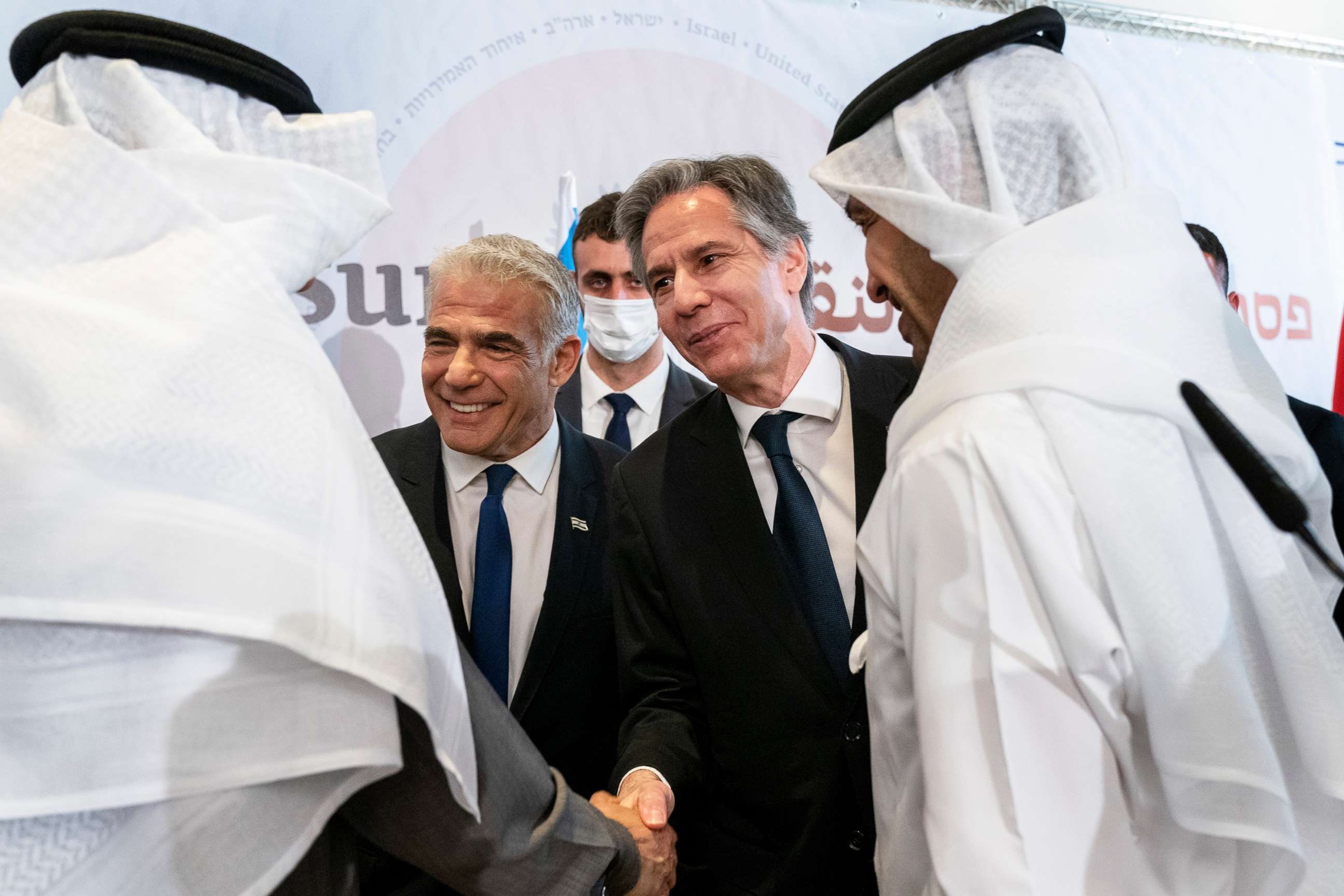
So far, Biden has had no luck with that effort -- with Saudi Arabia, in particular, remaining the key holdout -- and it's unclear what, if any, announcements will come from Monday's meeting.
But still, the symbolism of Israel hosting these Arab countries, with their U.S. backer, is a powerful one - a "dramatic signal of American alignment with Israel and moderate Arab states in the double shadow of the Ukraine crisis … and the likely return to the JCPOA Iranian nuclear agreement," according to Jim Jeffrey, a veteran U.S. diplomat and now the chair of the middle east program at the Wilson Center, a Washington think tank.
Those two security challenges are where ties have frayed between the U.S. and its Mideast allies and partners under Biden. In recent weeks, the U.S. has urged Israel, the UAE, and others to do more to punish Russia and support Ukraine -- although in Jerusalem Sunday, Blinken praised Israeli commitments to enforce sanctions and provide humanitarian support, including a field hospital deployed to western Ukraine.
In addition, as the State Department's team nears a renewed nuclear deal with Iran, Israel and Arab neighbors worry it will leave Iran flush with cash from sanctions relief -- ready to boost arms and funds to its proxies and expand its ballistic missile program. Several of these countries face near daily threats from Tehran and those proxies -- Hamas in Gaza and Hezbollah in Lebanon and Syria for Israel, and the Houthis for UAE and Saudi Arabia, which are particularly adamant that Biden's administration has not done enough to support them.
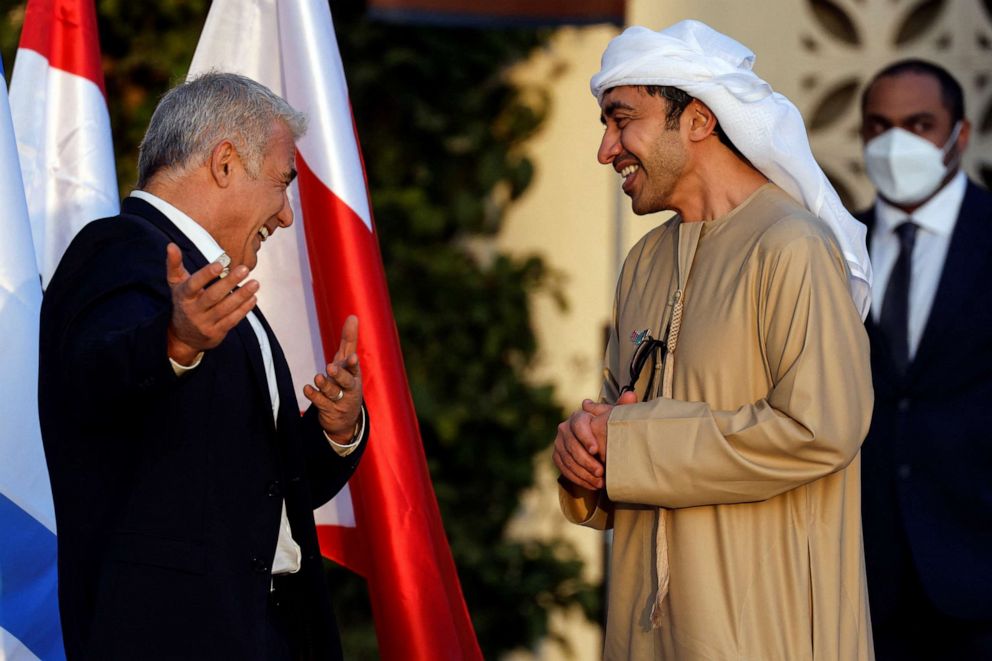
That made Monday's meetings a delicate dance for Blinken -- seeking to embrace the peaceful face of the Abraham Accords, while tempering the growing anti-Iran alliance as his team tries to complete a renewed Iran nuclear deal. In Jerusalem, Blinken papered over any differences, particularly with Israel, saying the two countries "are united in addressing the challenges posed by Iran, including its nuclear program."
But what the burgeoning Arab-Israeli ties don't address is the decades-old tensions between Israelis and Palestinians.
While Blinken fully embraced these Trump-era Abraham Accords, he didn't mention the former administration by name -- instead pledging the U.S. "has and will continue strongly support a process that is transforming this region and beyond."
During a six-way joint statement, Lapid announced that the group would meet again, making this Negev summit a forum -- with an open "door before all the peoples of the region, including the Palestinians and offering them to replace the way of terror and destruction with a shared future of progress and success."
That was Lapid's only mention of the Palestinians -- UAE's foreign minister Abdullah bin Zayed didn't mention them at all, instead gushing about how Israelis and Emiratis are "curious" about each other.
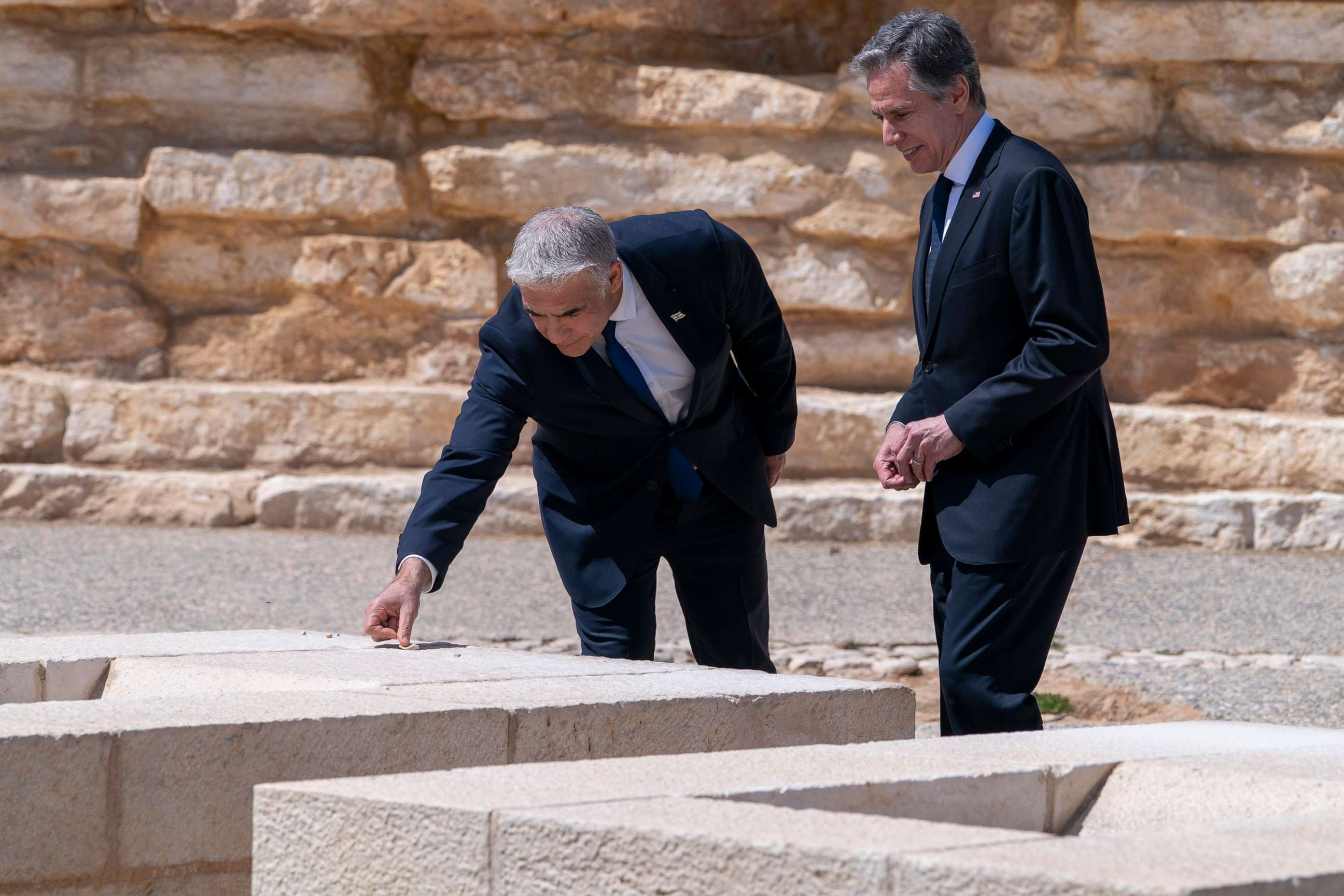
The major threat to the region's stability remains Iran. Israel and these Arab countries are especially concerned about a renewed nuclear deal filling Iran's coffers again to fund and arm proxy groups -- Hamas and Hezbollah that threaten Israel and the Houthis that threaten UAE and Saudi Arabia.
Blinken pledged Monday to "work together to confront common security challenges and threats, including those from Iran and its proxies" -- his only reference to what remains a dividing point with America's closest friends in this region.
The Biden administration was seized in one of its first foreign policy challenges by some of the worst violence in years between the Israeli military and Hamas, the U.S.-designated terror group that runs the Gaza Strip. Fighting lasted 11 days last May and killed over 250 people, the vast majority Palestinians.
But the risk of violence looms large again next month, with Judaism, Islam and Christianity's holy days virtually overlapping in April -- Passover, Ramadan, and Easter. The violence last spring erupted after Israeli restrictions on the Temple Mount during Ramadan and prospective evictions of Palestinians from their homes in east Jerusalem.
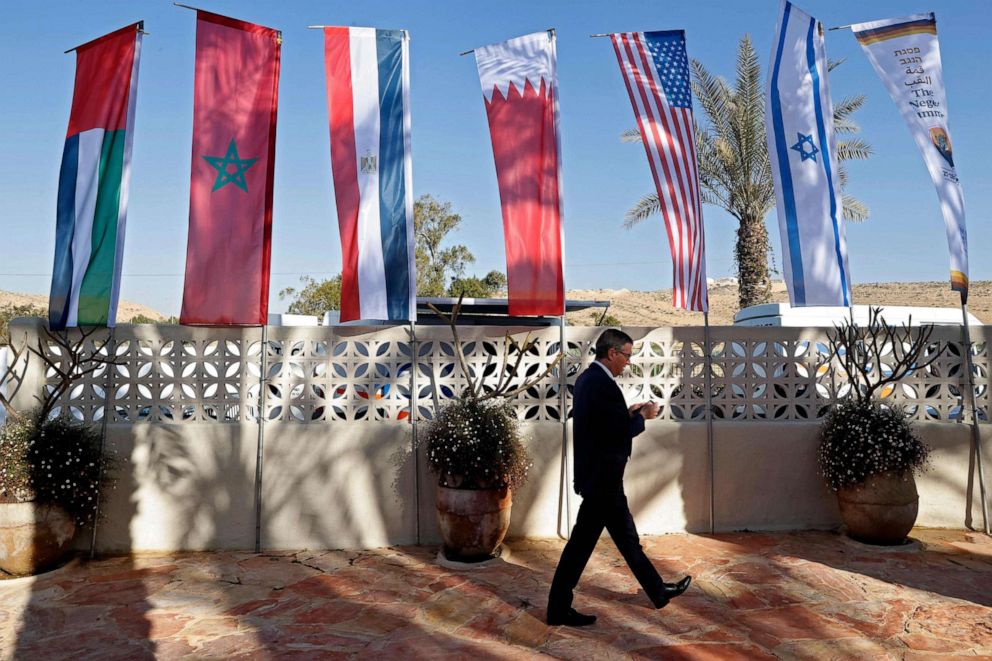
Egypt's Foreign Minister Sameh Shoukry warned of the specter of violence in Jerusalem next month, with Ramadan and Passover coinciding.
During meetings in Jerusalem and Ramallah, Blinken reiterated a constant U.S. message -- that both sides refrain from steps that could provoke the other.
Beyond that low bar, it seems Biden and Blinken have little interest in deep engagement on the issue. This is only Blinken's second trip to Israel and the West Bank in over a year in office, as the administration tries to focus attention on China and is consumed by Russia's war in Ukraine.
"Palestinians and Israelis alike deserve to live with equal measures of freedom, of opportunity, security, of dignity, and we believe that the most effective way, ultimately, to give expression to that basic principle is through two states," Blinken said Sunday with President Abbas.
But he added, "Of course, the two sides are very far apart, so we'll continue our work, step by step, to try to bring them closer."
One key question in that work is whether the U.S. will reopen its consulate general in East Jerusalem, which traditionally served as a consular operation for Palestinians. As part of its tense ties with Palestinian leaders, the Trump administration shuttered the facility when it moved the U.S. embassy to Jerusalem.
Blinken has promised to reopen the consulate, but Israeli officials are fiercely opposed to doing so, saying a U.S. consulate for Palestinians should be in what they consider Palestinian territory, not Jerusalem -- which both sides claim as their capital.
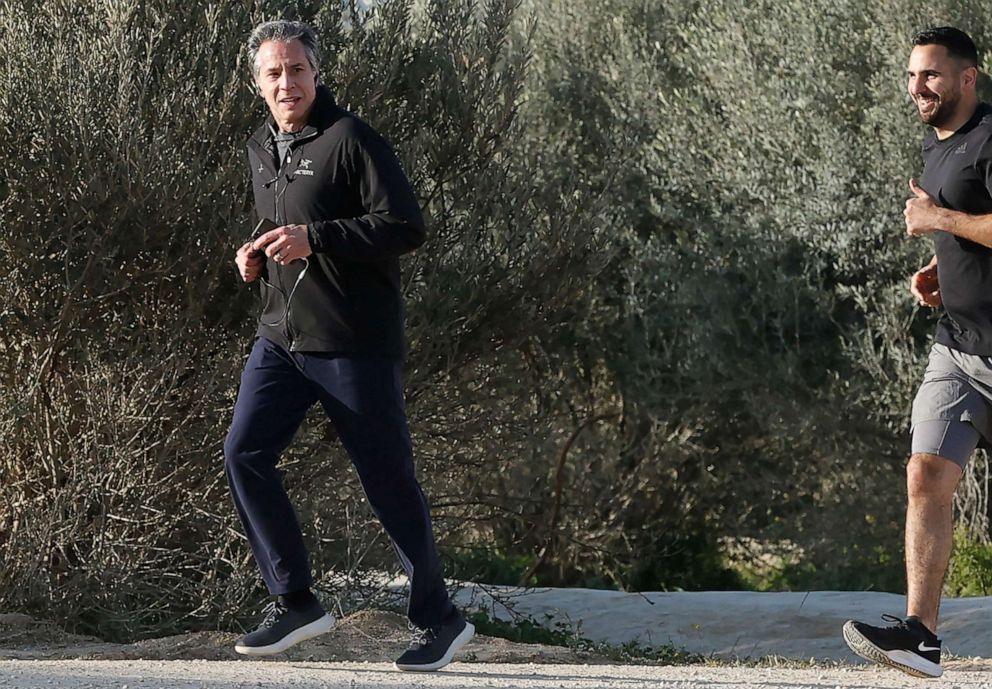
During remarks after their meeting, Abbas again welcomed the U.S. reopening the consulate -- which earned a head nod from Blinken.
But Blinken made no mention of it throughout his trip in Israel, including when Lapid was asked about it during a joint press conference Sunday.
"It's not even our place to say anything," Lapid said. "We just don't think Jerusalem is the right place for this because Jerusalem is the capital of Israel and Israel alone."
With that, Blinken and Lapid exited the room with a "thank you" to the press.



